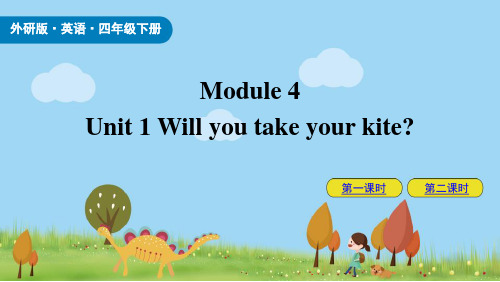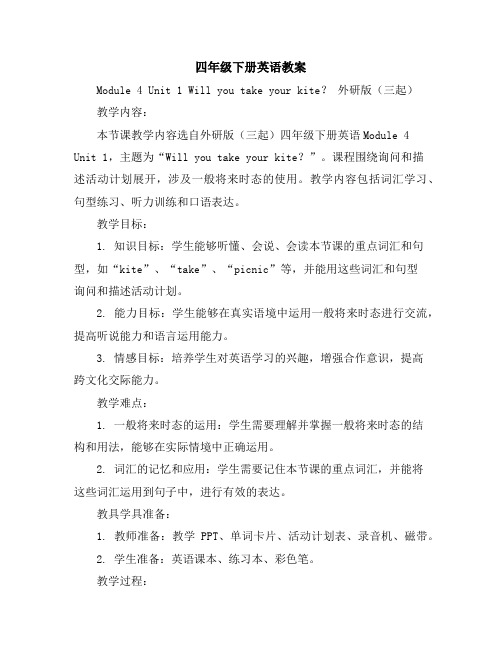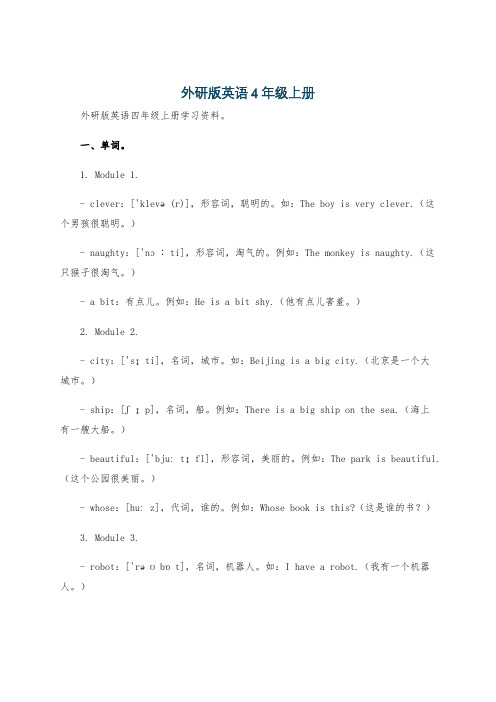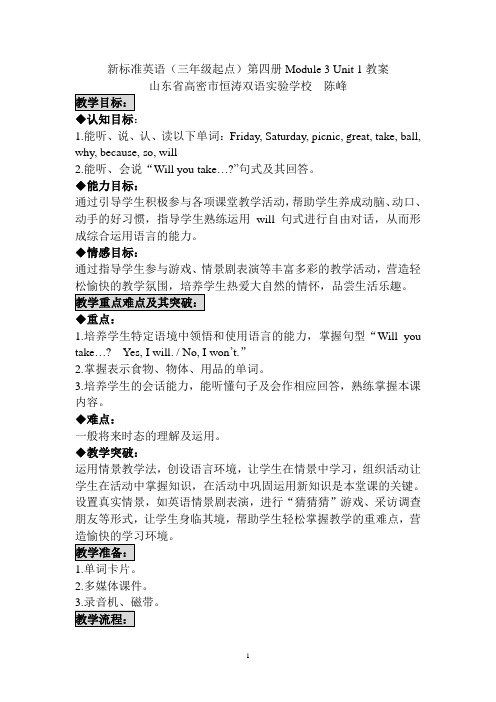Book4 Module3 Will you take your kite
外研版四年级英语下册《Will you take your kite》PPT优质课件

Module 4 Unit 1 Will you take your kite?
第一课时
第二课时
第一课时
Look and answer.
Can a bird fly?
Lookcat fly?
Listen, point and say.
picnic: 野餐
have a picnic: 去野餐
We will have a picnic this weekend.
great: 太好了,好极了 That’s a great picture.
- We will have a party this Sunday. - Great!
take: 带,拿 take away: 拿走 Take the umbrella to school.
On Saturday we’re going to have a picnic!
Great!
Will you take your kite tomorrow?
No, I won’t.
Oh. Will you take your ball
tomorrow?
No, I won’t.
Listen, point and find “Will you…?.
Will he come here tomorrow? No, he won’t.
Because tomorrow is Friday. Why not take your kite tomorrow ?
询问对方为什么不做某事的原因: - Why not+ 动词原形+ 其他? - Because+ 原因。
Oh! We’re going to have a picnic
will-you-take-your-kite-教学设计

《Will you take your kite》教学设计温泉学校小学部刘红艳(一)概述1.课名是《Will you take your kite》,是外研社小学英语教材三年级起点第四册的一篇课文。
本篇课文为Module 4的Unit 1.2.这一单元围绕着Amy一家打算去野餐展开会话及教学活动。
本节课主要是让学生会运用将来时描述自己的计划,这是本单元的重点,也是本学期的重点。
在本模块中,将对此知识点进行学习。
在综合操练、益智活动中还要进一步提高学生听、说、读、写综合素质能力。
(二)教学目标知识技能:1.学习、掌握 take fly picnic why not because 等单词2.能力灵活运用句型:Will you take your ---tomorrow?及其回答Yes ,I will. /No ,Iwon’t’. I will take ---过程方法:1.通过用TPR(全身反应法)、开火车等形式来学习课文中新的单词,提高学生学习英语的积极性。
2.通过游戏和表演的活动帮助学生掌握新知识,提高学生运用知识的能力。
能力目标:提高学生听、说、读、写等综合能力情感目标:通过引导学生参与游戏情景剧表演等丰富多彩的教学活动,锻炼学生的语言运用能力,培养其思考的意识和计划意识。
教学重点1.培养学生特定语境中领悟和使用语言的能力,掌握句型Will you take you---tomorrow? Yes ,I will. /No ,I won’t.2.准确地运用一般将来时的一般疑问句并能回答。
教学难点一般将来时的理解和运用,其中包含句子We are going to have a picnic .(三)学习者特征分析1.本节课的教学对象是四年级的学生,学生思维活跃,对英语非常感兴趣,英语表达的愿望很强烈。
2.学生的注意缺乏持久性,需要通过内容丰富的、形式多样的活动来引起学生的注意。
3.学生的逻辑思维能力比较差,需要及时引导学生进行归纳、总结。
四年级下册英语教案Module4Unit1Willyoutakeyourkite?外研版(三起)

四年级下册英语教案Module 4 Unit 1 Will you take your kite?外研版(三起)教学内容:本节课教学内容选自外研版(三起)四年级下册英语Module 4Unit 1,主题为“Will you take your kite?”。
课程围绕询问和描述活动计划展开,涉及一般将来时态的使用。
教学内容包括词汇学习、句型练习、听力训练和口语表达。
教学目标:1. 知识目标:学生能够听懂、会说、会读本节课的重点词汇和句型,如“kite”、“take”、“picnic”等,并能用这些词汇和句型询问和描述活动计划。
2. 能力目标:学生能够在真实语境中运用一般将来时态进行交流,提高听说能力和语言运用能力。
3. 情感目标:培养学生对英语学习的兴趣,增强合作意识,提高跨文化交际能力。
教学难点:1. 一般将来时态的运用:学生需要理解并掌握一般将来时态的结构和用法,能够在实际情境中正确运用。
2. 词汇的记忆和应用:学生需要记住本节课的重点词汇,并能将这些词汇运用到句子中,进行有效的表达。
教具学具准备:1. 教师准备:教学PPT、单词卡片、活动计划表、录音机、磁带。
2. 学生准备:英语课本、练习本、彩色笔。
教学过程:1. 导入:教师通过展示一张放风筝的图片,引导学生谈论与风筝相关的话题,激发学生的学习兴趣。
2. 新课呈现:教师呈现本节课的重点词汇和句型,通过图片、动作等多种形式帮助学生理解和记忆。
3. 操练:学生通过听录音、跟读、角色扮演等方式进行句型练习,巩固所学知识。
4. 应用:学生分组进行活动,根据实际情况制定活动计划,并运用所学句型进行询问和描述。
板书设计:1. Module 4 Unit 1 Will you take your kite?2. 重点词汇:kite、take、picnic等。
3. 重点句型:Will you take your kite?、I will take my picnic blanket.等。
小学英语《Module 4 U1 Will you take your kite》优质教案、教学设计

外研版小学英语(三年级起)四年级下册Module 3 Unit 1 Will you take your kite?教学设计一、教材分析本课是新标准英语三年级起点四年级下册Module 4 Unit 1Will you take your kite?本单元围绕“将来时”这一题材开展,通过询问别人将要带什么东西,使学生了解Will 引导的一般将来时态的一般疑问句的用法及回答。
通过本课的学习学生能够掌握单词:take , picnic , Why not ? , because ,以及掌握句型:Will you take your ...?及其相应的回答:Yes , I will . / No ,I won’t .二、学情分析本课教学内容适合四年级学生学习,四年级学生对英语有了一定的积累,在此之前他们已学过一般将来时的一种形式:be going to, 他们对一般将来时已有初步了解。
另外,四年级的学生爱说,爱动,善于表达。
因此,我在教学过程中非常注重对学生自主能力的培养,设计新颖的活动方式,充分激发学生的自主学习兴趣。
三、教学目标1. Knowledge aims :a.To grasp the new words :take , picnic , Why not ? , because 。
b.To grasp the sentence pattern :Will you take ...? and the answer :Yes , I will . / No , I won’t . 2.Ability aims :To use the sentence pattern “Will you take …?”to ask the other’s plans . And can use “Yes, I will. /No, I won’t . ” to answer.3.Emotion aims :To develop students ’ interests in English ; and to develop students’ abilities of cooperation ;To let the students enjoy the life .四、教学重点a、学生能够利用拼读规律正确掌握单词读音和模仿录音中的语调、语气朗读课文。
外研版英语4年级上册

外研版英语4年级上册外研版英语四年级上册学习资料。
一、单词。
1. Module 1.- clever:['klevə(r)],形容词,聪明的。
如:The boy is very clever.(这个男孩很聪明。
)- naughty:['nɔːti],形容词,淘气的。
例如:The monkey is naughty.(这只猴子很淘气。
)- a bit:有点儿。
例如:He is a bit shy.(他有点儿害羞。
)2. Module 2.- city:['sɪti],名词,城市。
如:Beijing is a big city.(北京是一个大城市。
)- ship:[ʃɪp],名词,船。
例如:There is a big ship on the sea.(海上有一艘大船。
)- beautiful:['bjuːtɪfl],形容词,美丽的。
例如:The park is beautiful.(这个公园很美丽。
)- whose:[huːz],代词,谁的。
例如:Whose book is this?(这是谁的书?)3. Module 3.- robot:['rəʊbɒt],名词,机器人。
如:I have a robot.(我有一个机器人。
)- will:[wɪl],助动词(表示将来)。
例如:I will go to school tomorrow.(我明天将去上学。
)- everything:['evriθɪŋ],代词,所有事情。
例如:He can do everything.(他能做所有事情。
)- one day:(将来)有一天。
例如:One day, I will be a doctor.(有一天,我将成为一名医生。
)4. Module 4.- housework:['haʊswɜːk],名词,家务。
例如:I often do housework on Sunday.(我经常在星期天做家务。
新标准英语(三年级起点)第四册Module 3 Unit 1教案

新标准英语(三年级起点)第四册Module 3 Unit 1教案山东省高密市恒涛双语实验学校陈峰◆认知目标:1.能听、说、认、读以下单词:Friday, Saturday, picnic, great, take, ball, why, because, so, will2.能听、会说“Will you take…?”句式及其回答。
◆能力目标:通过引导学生积极参与各项课堂教学活动,帮助学生养成动脑、动口、动手的好习惯,指导学生熟练运用will 句式进行自由对话,从而形成综合运用语言的能力。
◆情感目标:通过指导学生参与游戏、情景剧表演等丰富多彩的教学活动,营造轻松愉快的教学氛围,培养学生热爱大自然的情怀,品尝生活乐趣。
◆重点:1.培养学生特定语境中领悟和使用语言的能力,掌握句型“Will you take…? Yes, I will. / No, I won’t.”2.掌握表示食物、物体、用品的单词。
3.培养学生的会话能力,能听懂句子及会作相应回答,熟练掌握本课内容。
◆难点:一般将来时态的理解及运用。
◆教学突破:运用情景教学法,创设语言环境,让学生在情景中学习,组织活动让学生在活动中掌握知识,在活动中巩固运用新知识是本堂课的关键。
设置真实情景,如英语情景剧表演,进行“猜猜猜”游戏、采访调查朋友等形式,让学生身临其境,帮助学生轻松掌握教学的重难点,营造愉快的学习环境。
1.单词卡片。
2.多媒体课件。
I、Greetings:T: Good morning, boys and girls.Ss: Good morning, Mr Chen.师生互致问候。
II、Warming-up:1.Boys and girls, let’s sing the song “London Bridge is falling down”and do the actions. OK? Let’s begin!百度音乐盒(歌曲London Bridge is falling down)/m?word=mp3,,,[london+bridge+is+fallin g+down]&cat=0&gate=1&ct=134217728&tn=baidumt,london+bridge+is +falling+down++&si=london+bridge+is+falling+down;;twins;;44342;;44 342&lm=-1&mtid=5&d=7&size=1048576&attr=0,0&titlekey=31172641 1,190899277边唱边做动作。
Module 4 Unit 1 Will you take your kite(教案)-2022-2
Module 4 Unit 1: Will You Take Your Kite?教学目标:1.学习与风筝有关的词汇,如kite,string,fly等2.学会运用一般将来时描述将要做的事情3.学会询问他人的计划和打算,并据此进行相应的回答教学过程:1. 导入新课1.老师自我介绍并问候全班学生,制造良好的教学氛围2.展示风筝的图片或实物,引导学生感性认识风筝及与风筝有关的英文单词3.引出本节课的话题:Will you take your kite?(你会带上你的风筝吗?)2. 学习重点内容1.介绍一般将来时的概念和用法,如will+动词原形,表示将来的行为或打算2.搭配句型:Will you + 动词原形?3.运用一般将来时表达自己的打算和计划,如I will take my kite.等4.学习与风筝有关的词汇及表达方式,如string,fly等3. 情景模拟1.设计情景,在班级或户外环境中,询问其他同学是否会带上自己的风筝2.给定角色扮演任务,提供相关句型和词汇,引导学生进行交际练习3.督促学生围绕主题展开对话,营造英语语言环境4.评估学生语言表达和交流能力,并针对问题进行点评4. 巩固训练1.设计相关练习,围绕所学语言点进行练习,如填空、判断、连线等2.向学生提供能够激起其学习兴趣的任务,如画风筝图案、做风筝等3.为激励学生的学习积极性,可以设置竞赛活动等4.对学生的练习情况进行点评,提供针对性的指导和反馈5. 总结反思1.总结本节课学习的内容,强化关键语言点,如一般将来时和风筝相关词汇2.收集学生的反馈意见,探讨如何更好地提高教学效果3.指导学生自主学习,提供相关学习素材和资源4.鼓励学生积极参与英语学习,建立英语学习兴趣和信心教学反思:本节课的教学目标主要是使学生掌握一般将来时的用法,运用相关语言点表达自己的打算和计划,并能够反馈他人的意愿和计划。
通过与风筝有关的内容和情景模拟练习,可以提高学生的兴趣和学习效果。
四年级下英语教学设计-Module4Willyoutakeyourkite-外研社(三起)
四年级下英语教学设计Module4 Will you take your kite 外研社(三起)教学内容:本节课为四年级下英语Module4单元,主题为“Will you take your kite”,主要围绕即将到来的学校郊游活动,学习如何询问和回答关于活动的准备情况。
教学内容包括新单词的学习,如“kite”、“picnic”、“tent”等,以及将来时态“will”的使用。
通过本节课的学习,学生能够掌握基本的询问和回答技巧,并能用英语描述自己的郊游计划。
教学目标:1. 知识与技能:学生能够听懂、会说、会读本节课的新单词和句型。
2. 过程与方法:通过小组合作、角色扮演等活动,培养学生合作学习和英语交际能力。
3. 情感态度价值观:激发学生对英语学习的兴趣,培养他们积极向上的学习态度。
教学难点:1. 将来时态“will”的使用,尤其是构成疑问句和否定句的语法规则。
2. 新单词的发音和拼写,特别是多音节单词的正确发音。
教具学具准备:1. 多媒体课件:包括本节课的单词卡片、句型示例、相关图片和视频。
2. 教学录音机:用于播放课文录音,帮助学生模仿正确的语音语调。
3. 学生用书和练习册:供学生在课堂上使用和练习。
教学过程:1. 导入:通过展示郊游活动的图片,引导学生谈论他们对郊游的期待和准备。
2. 新课呈现:利用多媒体课件展示新单词,教授其发音和拼写,并引导学生练习句型。
3. 小组活动:学生分组进行角色扮演,模拟郊游准备场景,练习使用新学到的句型。
4. 巩固练习:通过练习册上的相关练习,巩固学生对新知识点的掌握。
板书设计:1. Module4 Will you take your kite2. 新单词列表:kite, picnic, tent, map, camera, etc.3. 句型示例: Will you take your kite? Yes, I will. / No,I won't.4. 将来时态构成规则:will + 动词原形作业设计:1. 完成练习册上的相关练习。
外研版四级英语下册知识点总结
外研版四年级英语下册总结Module1--10短语Module 1 短语1、my friends 我的朋友们2、a bit 一点儿3、a nice teacher 一位友善的老师4、a clever pupil 一个聪明的小学生5、a very naughty bird 一只非常淘气的鸟儿6、my big brother我的大兄弟哥哥7、my little sister我的小妹妹Module 2 短语1、a book about London 一本伦敦的书2、be from…来自…是…人3、the capital of England 英国的首都4、Buckingham Palace白金汉宫5、the Queen’s house皇后女王的房子6、the River Thames泰晤士河7、on the river在河上8、Big Ben大本钟9、Hyde Park 哈德公园10. Tower Bridge塔桥11. London Beidge伦敦桥12 fall down倒下Module 3 短语:2、on Saturday 在星期六3、have a picnic 举行、进行野餐5、take your kite 带上你的风筝6、go swimming 去游泳7、next week 下周8、a holiday 一个假期9、play with my friends和我的朋友玩10、go to the park 去公园11、do myone`s homework 做我的某人的作业12、visit my grandma 拜访我的奶奶13、help my mother 帮助我妈妈做家务14、read my books 看我的书Module4 短语1、one day 有一天/总有一天2、do the housework 做家务3、help children learn帮助孩子们学习4、do our homework 做我们的作业5、make cakes 做蛋糕6、listen to music 听音乐7、in Beijing 在北京8、The Weather Tomorrow 明天的天气情况9、be windy 刮风的10、be hot 炎热的11、I don`t know .我不知道.12、be cloudy 阴天/多云的Module5短语:1、stand up 起立2、the Changjiang River 长江3、the Yellow River 黄河4、Mount Qomolangma 珠穆朗玛峰5、Mount Tai 泰山6、the Great Wall 长城7、the Summer Palace 颐和园Module6 短语:1、the first girl 第一个女孩2、Be quiet ,please请安静3、that little boy那个小男孩4、the winner 冠军/胜利者5、Chinese music中国音乐6、play the erhu拉二胡7、play the zither 弹古筝8、pop music 流行音乐9、play the guitar弹吉他10、play the drums打架子鼓11、what music 什么音乐Module7. 短语:1、New York纽约2、in the east在东部3、be called 被称作…4、the USA美国5、speak English说/讲英语6、in America在美国7、That`s right.不错/那是正确的.8、Washington . 华盛顿10、San Francisco旧金山11、a nice city一座好城市12、in the west在西部13、in the north在北部14、a famous city一座着名的城市15、in the south在南部/方Module 8 短语:1、that little girl那个小女孩2、so short如此矮3、so cute如此可爱Module 9 短语:1.help Mumhelp sb.帮助妈妈2..phone grandmaphone sb.给奶奶打电话4.cook fish做鱼5.listen to music听音乐in the park在公园里散步to some friends和一些朋友聊天nice day一个好天on the computer玩电脑about.....什么怎么样lunch做午饭noodles for lunch 午饭做面条weekend上周末Module 10 短语:1.what happened to.........怎么了for a bike ride去骑自行车then....那后来呢hungry饿了thirsty渴了a watermelon买西瓜buy sth.买某东西 the bike在自行车off his bike从自行车上摔下来my head碰了我的头10.lots of许多biscuits巧克力饼干got /have a stomachache肚子/胃疼 a cold感冒a headache头疼a fever发烧a horrible cold重感冒cold感觉冷hot感觉热one`s head抓/挠头Module 1.句子1、These are my friends.这些是我的朋友.2、This is Maomao.这是毛毛.3、She is a bit shy.她有点害羞.4、She is a nice teacher.她是一位友善的老师.5、He`s cool.他很酷.6、She has a little curl.她有一小绺鬈发.7、Are you naughty Yes,I am./No,I am not.你淘气吗是的,我淘气./不,我不淘气.Module 2.句子1、What`s this 这是什么 It`s a dog .2、It`s a book about London . 它是一本伦敦的书.3、London is the capital of England .伦敦是英国的首都.4、I`m from London .我来自伦敦.5、It`s very big and very beautiful .它非常大非常美丽.6、But It`s very beautiful ,too .但它也很美丽.7、This is the River Thames .这是泰晤士河.8、It`s long and wide .它又长又宽.9、There are many boats on the river .河上有许多船.10、It`s very famous .它非常着名.11、Is it tall Yes,it is.它是高的吗是的,它是.一般疑问句把“is”提前.12、London Bridge is falling down .伦敦桥倒了.Module 3.句子1、On Saterday we`re going to have a picnic .星期六我们准备去野餐.2、Will you take your kite tomorrowYes,I will/No,I won`t.明天你将带风筝去吗是的,我将带.不,我不会的.will的一般疑问句及肯、否定回答3、Why not Because tomorrow is Friday.为什么不呢因为明天是星期五.4、So I will take my kite and my ball on Saterday.因此星期六我将带风筝和球.5、Next week is a holiday.下周是假期.6、What will you do ,ShanshanOn Monday I`ll go simming .珊珊,你打算做什么星期一我去游泳.7、What will Shanshan do on Monday星期一珊珊将要干什么will的特殊疑问句8、Today is Monday and tomorrow is Tuesday.今天是星期一,明天是星期二.9、Will you play football on MondayYes,I will/No,I won`t.星期一你将踢足球吗是的,我会./不,我不会.will可以应用于各种人称,其形式不变.Module 4.句子1、What`s that It`s a robot .那是什么它那是一个机器人.2、It can walk 它会走再如This bird can talk .这只鸟儿会说话.3、One day robots will do everything .总有一天,机器人会做所有的事情.4、And they will help children learn .并且他们能帮助孩子们学习.5、Will they do our homework No,they won`t .他们将会做家庭作业吗不,他们不会.6、Will it be windy in Beijing Yes ,it will ./No. it won`t.北京将会使刮风天吗是的,它会./不,它不会.注意表示天气变化的词:windy刮风的/有风的;rainy下雨的/多雨的;snowy下雪的/多雪的;sunny晴朗的/阳光充足的;cloudy多云的/阴天;hot炎热的;cold寒冷的;warm暖和的;cool凉爽的/凉快的.7、What will the weather be today 今天的天气怎样8、Will it be sunny tomorrow Yes ,it will ./No ,it wom`t .明天天气晴朗吗是的,它将是./不,它不是.Module 5.句子1、Amy`s taller than Lingling .艾米比玲玲高.2、Is Sam stronger than Lingling Yes ,he is ./No ,he isn`t .萨姆比玲玲强壮吗是的,他是./不,他不是.再如:Are you taller than me Yes ,I am .你比我高吗是的,我是.3、The Changjiang River is longer than the Yellow River ,长江比黄河长.4、Mount Qomolangma is higher than Mount Tai .珠穆朗玛峰比泰山高.5、The Great Wall is older than the Summer Palace 长城比颐和园历史悠久.6、北京比天津大.Beijing is bigger than Tianjin .Module 6.句子1、This girl is good/bad .这个女孩是好的/差的.再如:This book is good .That book is bad .这本书好,那本书不好.2、I like her voice .我喜欢她的声音.“我不喜欢她的声音”怎么说I don`t like her voice3、I think this girl is better than the first girl .我认为这个女孩比第一个女孩更好.再如:I think she`s worse .我认为她更差.4、Do you agree ,Sam No ,I don`t .萨姆,你同意吗不,我不同意.5、Who is that little boy It`s Tom . He`s our brother . 那个小男孩是谁是汤姆.他是我们的兄弟.6、Daming and Lingling like Chinese music .大明和玲玲喜欢中国音乐.再如:I like pop music .我喜欢流行音乐.7、They can play the erhu .他们会拉二胡.8、What music do you like Ilike pop music .I think pop music ia better .你喜欢什么音乐我喜欢流行音乐.我认为流行音乐较好.Module 7.句子1、New York is in the east.纽约在东部.Washington . is in the east.华盛顿在东部.2、This is my project.这是我的综合实践活动.It`s about America.它是美国的.4、It`s also called the USA.它也被称作美利坚合众国.He is called Lao Wang.他被叫做老王.5、People speak English in America.在美国人们说英语/美国人说英语.People speak English in England.在英国人们讲英语.6、Washington . is the capital of the USA.华盛顿是美国的首都.伦敦是英国的首都London is the capital of England,;北京是中国的首都.Beijing is the capital of China.7、My cousin,Dalong ,lives there.我的堂兄,大龙,I live in Beijing .我住在北京.Sam lives in New lives there,too.萨姆住在纽约.艾米也住在那儿.8、Where is New YorkIt`s in the east.纽约在哪儿它在东部.上海在哪儿它在东部.Where is Shanghai It`s in the east. Where is New York 9、Sanya is a famous city in China.三亚是中国着名的城市.9、San Francisco is a famous city in America.旧金山是美国着名的城市.练习:西安是中国着名的城市.Xian is a famous city in China.10、I want to visit Emgland and go to London ,too.我要去英国旅游,也要去伦敦.11、I want to go swimming .我要去游泳.Module 8.句子1、 Who are they,LinglingThey are my grandparents. 玲玲.他们是谁他们是我的祖父母.2、Who is that little boyIt`s Tom.那个小男孩是谁是汤姆.They are my were young,then.他们是我的祖父母.他们那时是年轻的.2、They are old.他们是年老的.练习:她那时是胖的,她现在是瘦的.She was fat,`s thin now.3、I was two,then.我那时两岁了.练习:I was three, am 11 now.我那时三岁了,我现在11岁了.4、But your hair was so short.但是那时你的头发是如此的短.再如:You were so cute.你如此可爱.练习:她那时也非常淘气.Then she was very naughty,too.5、She was she`s thin.她那时胖,她现在瘦了.练习:他那时矮,他现在高.He was short,he is tall now. .他们那时年轻,现在他们上年纪了年老了.They were young,they are old now.6、They weren`t old then .They were young.练习:她那时不高,她是很矮.She wasn`t tall was short. .他那时不淘气.他是可爱的.He wasn`t naughty was cute它那是不胖.它是瘦的. It wasn`t fat was thin.7、Was it fat No,it wasn` was thin.它胖吗不,它不胖.它是瘦的.练习:他们年轻吗不,不是的.他们年老了.Were they youngNo,they weren`他淘气吗不,不是的.他是可爱的.hey were old. Was he naughty No,he wasn` was cute.Module 9.句子1.On Monday Amy phoned Grandma.星期一,艾米给奶奶打电话了.2.再如:Yesterday Grandma cooked fish.昨天奶奶做鱼了.我们在公园里散步并和一些朋友聊天.We walked in the park and we talked to some friends.2.Did you cook meat yesterdayNo,Ididn`t.昨天你做肉了吗不,没有.再如:Did you listen to musicNo,we didn`t.你们听音乐了吗不,我们没有.你和萨姆帮助你妈妈吗是的,我们帮助了.Did you and Sam help your motherYes,we did.3.Was it a nice day天气是个好天吗再如:Was it Monday yesterday昨天是星期一吗练习:昨天天气晴朗吗是的,晴朗..Was it sunny yesterdayYes,it was.4.Did it rain hereNo,it didn` rained here.这儿下雨了.5.I helped Sam didn`t played on the computer.我帮助妈妈了.但是萨姆没有帮助.它在玩电脑.再如:Dad watched TV,he didn`t help Mum.爸爸看电视,他没有帮助妈妈.6.What about Tom汤姆怎么样呢再如:Yesterday I watched about you昨天我看电视的,你呢7.Yesterday Mr Smart cooked noodles for lunch.昨天斯玛特先生午饭做面条了.再如:I cooked fish for lunch.我午饭做鱼了.8.Did Dad cook lunchYes,he did./No,he didn`t.爸爸做午饭了吗是的,他做了./不,他没做.练习:你上周末打篮球了吗不,我没有.Did you play basketball last weekendNo,I didn`t.萨姆帮助妈妈了吗不,他没有.Did Sam help MumNo,he didn`t.9.We walked and walked .We talked and talked.我们走呀走.我们说呀说.练习:我们笑呀笑.我们玩呀玩.We laughed and played and played.Module 10.句子1.What happened to your head,Daming大明,你的头怎么了再如:What happened to your bike你的自行车怎么了2.Sam and I went for a bike ride yesterday.昨天我和萨姆去骑自行车了.如:Sam likes riding a bike.萨姆喜欢骑自行车.3.And then....然后呢这是说发生事情有时间先后联系的句子常用的连接词,then在这儿讲“后来”4.And then we were hungry and thirsty.然后我们又饥又渴.再如:I am hungry,he is thirsty.我饿了,他渴了.5.So we bought a watermelon.所以我们就买了个西瓜.so在描述一个事件时,用来连接因果关系的句子.再如:I got up at 9:oo this morning,so I was late for my class.今天早上我九点钟才起床,所以我迟到了.6.Sam carried the watermelon on the bike.萨姆在自行车带着西瓜.7.Then Sam fell off his bike.萨姆从他的自行车上摔下来了.再如:He fell off the desk.他从桌子上掉下来了.8.And the watermelon bumped my head西瓜砸/碰了我的头.再如:The apple bumped my face.那个苹果砸了我的脸.9.Sam had lots of chocolate biscuits yesterday,so today he`s got a stomachache.昨天萨姆吃了许多巧克力饼干,所以今天他胃疼.再如:Daming had two watermelons yesterday,so today he`s got a stomachache.大明昨天吃了两个西瓜,所以今天他肚子疼.10.Amy had a cold yesterday,and today she`s got a headache.艾米昨天感冒了,所以今天她头疼.再如:Little Tommy had a horrible cold,His nose was red and he felt cold,cold,cold.小汤姆得了重感冒,他的鼻子红了,他感觉冷呀冷.1、反义词:old老的——young年轻的old旧的——new新的long长的——short短的big大的——small小的east东——west西south南——north北good好的——bad差的better更好的——worse更差的tall高的——short矮的then那时——now现在fat胖的——thin瘦的little小的——big大的here这里——there那里hot热的——cold冷的2、对应词east东——west西south南——north北why为什么——because因为then那时——now现在this这个——that那个3、过去式:go去——wentdo做——didbuy买——bought fall跌落——fellread读——readget获得——gothave/has有——hadam/is是——wasare是——wereeat吃——atedance跳舞——danced watch观看——watched carry携带——carried bump碰——bumpedplay玩——playedhelp帮助——helpedrain雨——rainedwalk走路——walkedtalk说话——talked4、原级/比较级:good好的——better更好的bad差的——worse更差的big大的——bigger更大的thin瘦的——thinner更瘦的fat胖的——fatter更胖的hot热的——hotter更热的 old老的——older更老的 long长的——longer更长的tall高的——taller更高的young年轻的——younger更年轻的short短的——shorter更短的high高的——higher更高的。
小学英语三起点第四册Module3_Will_you_take_your_kite
√
B. Because tomorrow is Friday.
:We’re going to have a
picnic tomorrow.
:Yes, I will. Will you take some biscuits, Meiyangyang?
:Great!
:No, I won’t. I will take my doll.
: Will you take a kite,
Xiyangyang?
:Will you take some biscuits, Lanyangyang?
:Yes, I will. Will you take a ball?
:No, I won’t.
I will take some cakes.
--We ’re going to go to … Will you take your…?
Let’s say a chant:
Saturday Picnic Saturday picnic on Saturday have a picnic
We’re going to have a picnic on Saturday.
Picnic
have a picnic
a cap
I will take
Read and choose.
They’re going to have a picnic on____. A. Friday
√
B. Saturday
Listen and circle Yes or No.
1.Amy will take her ball on Friday. Yes No
2.Sam thinks(认为) tomorrow is Saturday. Yes No
- 1、下载文档前请自行甄别文档内容的完整性,平台不提供额外的编辑、内容补充、找答案等附加服务。
- 2、"仅部分预览"的文档,不可在线预览部分如存在完整性等问题,可反馈申请退款(可完整预览的文档不适用该条件!)。
- 3、如文档侵犯您的权益,请联系客服反馈,我们会尽快为您处理(人工客服工作时间:9:00-18:30)。
Module 3
Unit1 Will you takay • Wednesday • Thursday • Friday • Saturday • Sunday
Spring is coming···
I’m going to have a picnic.
: Will you take a kite,
Xiyangyang?
:Will you take some apples, Lanyangyang?
:Yes, I will. Will you take a ball? :Yes, I will. Will you take some apples, Meiyangyang?
We’re going to have a picnic.
We’re going to have a picnic. Will you take···? ? No,I won’t. Yes,I will.
a ball
a kite
some bread some rice
some biscuits some apples
a cake
some noodles
Read and choose.
1.They’re going to have a picnic on____. A. Friday
√
B. Saturday
2. Sam and Amy ______ picnics.
√
A. like
B. don’t like
Listen and circle Yes or No.
1.Amy will take her ball on Friday. Yes No
2.Sam thinks(认为 tomorrow is Saturday. 认为) 认为 Yes No
:We’re going to have a
picnic tomorrow.
:No, I won’t. I will take my doll.
I will take a ball. I will take some biscuits.
Goodbye!
:No, I won’t. I will take some cakes.
Homework:
If you are going to have a picnic, what will you take? Please draw and write like this:
如果你要去野餐,你会带什么去呢? 如果你要去野餐,你会带什么去呢? 请画下来,并仿照下面的句子写一写: 请画下来,并仿照下面的句子写一写:
